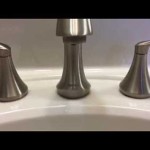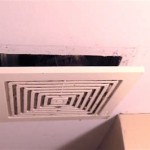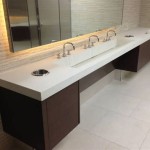Choosing the Right Material for Your Bathroom Countertop
Selecting the appropriate material for a bathroom countertop is a crucial decision in any bathroom renovation or construction project. The countertop not only serves a functional purpose, providing space for toiletries and daily routines, but also significantly contributes to the overall aesthetic of the bathroom. Various materials are available, each with distinct advantages and disadvantages concerning durability, maintenance, aesthetics, and cost. A careful evaluation of these factors is necessary to make an informed choice that aligns with individual needs, budget, and design preferences.
The bathroom environment is inherently demanding. Countertops are routinely exposed to moisture, humidity, and temperature fluctuations. Furthermore, they encounter a range of substances, including soaps, cosmetics, cleaning agents, and potential spills. Therefore, the chosen material must possess sufficient resistance to these elements to ensure longevity and maintain its appearance over time. Considerations such as stain resistance, water absorption, and ease of cleaning are paramount.
Beyond functionality, the aesthetic appeal of the countertop is equally important. The countertop is often a focal point in the bathroom, influencing the overall style and ambiance. Materials vary widely in terms of color, pattern, texture, and finish, offering a diverse range of design possibilities. Matching the countertop material to the existing or planned bathroom décor is essential for creating a cohesive and visually pleasing space.
Key Point 1: Exploring Natural Stone Options
Natural stone countertops, such as granite, marble, and quartzite, offer a luxurious and timeless aesthetic. These materials are quarried from the earth and possess unique veining and patterns, making each slab one-of-a-kind. However, natural stone also requires specific care and maintenance to preserve its beauty and integrity.
Granite: Granite is a highly durable and heat-resistant material, making it a popular choice for countertops. It is relatively resistant to scratches and stains, although sealing is essential to prevent absorption of liquids and oils. Granite is available in a wide range of colors and patterns, from subtle and neutral to bold and dramatic. The cost of granite can vary significantly depending on the rarity and complexity of the pattern. Regular cleaning with a pH-neutral cleaner and periodic resealing are recommended to maintain its appearance.
Marble: Marble is renowned for its elegant and sophisticated appearance. Its characteristic veining and smooth texture add a touch of luxury to any bathroom. However, marble is more porous than granite and susceptible to staining and etching from acidic substances. Therefore, diligent sealing and immediate cleaning of spills are crucial. Marble is also softer than granite and may be more prone to scratches. While marble offers a stunning aesthetic, it requires more careful maintenance and may not be suitable for high-traffic bathrooms. Polished marble is especially susceptible to etching, whereas honed finishes can better conceal minor imperfections.
Quartzite: Quartzite is a naturally occurring metamorphic rock that is formed from sandstone. It is harder and more durable than marble, making it a desirable alternative for those who appreciate the look of marble but require greater resistance to scratches and stains. Quartzite still needs to be sealed to prevent staining, but it generally requires less maintenance than marble. It comes in a range of colors and patterns, often resembling marble but offering superior performance in a bathroom environment. However, some quartzites can be more porous than others, so proper sealing and care are necessary.
When choosing natural stone, it's essential to inspect the specific slab before installation to ensure it meets your aesthetic expectations and to understand any potential imperfections or variations in the pattern. Engaging a professional installer is also crucial for proper sealing and installation to prevent future problems.
Key Point 2: Examining Engineered Stone and Solid Surface Alternatives
Engineered stone and solid surface materials provide alternatives to natural stone, offering a combination of durability, design flexibility, and ease of maintenance. These materials are manufactured, allowing for greater consistency in color and pattern, as well as the incorporation of specific performance characteristics.
Quartz: Quartz countertops are engineered from natural quartz crystals combined with resins and pigments. This composition results in a highly durable and non-porous surface that is resistant to scratches, stains, and bacteria. Quartz countertops do not require sealing and are easy to clean with mild soap and water. They are available in a wide range of colors and patterns, including options that mimic the look of natural stone. While quartz is heat-resistant, prolonged exposure to high heat can cause damage. The consistent color and pattern of quartz can be an advantage for those seeking a uniform look, but some may find it lacks the unique character of natural stone.
Solid Surface: Solid surface countertops are made from acrylic or polyester resins combined with mineral fillers. They are non-porous and stain-resistant, making them a practical choice for bathrooms. Solid surface materials can be molded into various shapes and sizes, offering design flexibility, including seamless integration with sinks. Scratches and minor damage can often be repaired, making them a relatively low-maintenance option. Solid surface materials are not as heat-resistant as quartz or granite and can be susceptible to scratching. The aesthetic appearance of solid surface can vary, but generally leans towards a more contemporary and understated look.
When considering engineered stone or solid surface, it's important to compare the specific brands and product lines, as the quality and performance characteristics can vary. Reviewing warranties and manufacturer specifications is also recommended.
Key Point 3: Considering Other Countertop Material Options
Besides natural and engineered stone, other countertop materials are available, each with its unique set of properties and aesthetic qualities. These options may be suitable for specific bathroom designs or budget constraints.
Laminate: Laminate countertops are made from layers of plastic laminate bonded to a particleboard core. They are a cost-effective option that comes in a wide variety of colors and patterns. Laminate is relatively easy to clean, but it is susceptible to scratches, stains, and damage from heat and moisture. The seams in laminate countertops can also be vulnerable to water penetration, leading to swelling and delamination. While laminate offers affordability and design versatility, it is generally less durable and long-lasting than other countertop materials. Laminate is best suited for bathrooms with lower budgets. Edges are often the weakest points on laminate countertops, requiring careful attention to prevent water damage.
Tile: Tile countertops can be a visually appealing and durable option, especially for those seeking a unique or custom look. Tile is available in a wide variety of materials, including ceramic, porcelain, and glass. Grout lines can be a challenge to keep clean and maintain, and they can be susceptible to staining and mildew growth. Epoxy grout offers improved stain resistance and durability compared to traditional grout. Tile countertops can be a labor-intensive installation. Selecting the right tile for countertops requires considering factors like water absorption, slip resistance, and durability.
Concrete: Concrete countertops offer a modern and industrial aesthetic. They can be custom-made to any size and shape and can be stained or polished to achieve a variety of looks. Concrete is porous and requires sealing to prevent staining and water damage. It can also be prone to cracking if not properly reinforced. Concrete countertops are heavy and require strong cabinet support. The cost of concrete countertops can vary significantly depending on the complexity of the design and installation. Concrete countertops are a unique and often expensive option.
When exploring alternative countertop materials, it's crucial to consider their specific limitations and maintenance requirements. Carefully weigh the pros and cons of each material in relation to your budget, design preferences, and lifestyle.
Ultimately, the best material for a bathroom countertop depends on a careful evaluation of individual needs and priorities. By considering factors such as durability, maintenance, aesthetics, and cost, homeowners can make an informed decision that results in a beautiful and functional bathroom space.

7 Countertop Materials For Bathrooms

7 Countertop Materials For Bathrooms

6 Best Bathroom Countertops Chic Countertop Materials

Bathroom Countertops 101 The Top Surface Materials

7 Types Of Countertops For Bathrooms

Best Stone Material For Upgrading Your Bathroom Countertop

Comparing Bathroom Countertop Materials Which Is Right For You

Choosing The Best Material For Bathroom Countertops Home Matters Ahs

The Most Popular Bathroom Countertop Materials Vbathroom

Bathroom Countertop Guide Unique Vanities
Related Posts







